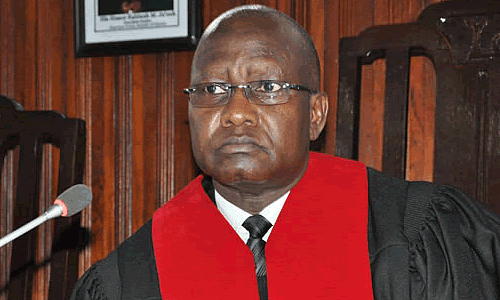Mass incarceration in Monrovia

 Liberia’s Chief Justice Francis S. Korkpor says “prolonged detention without trial” remains a serious challenge within the justice sector here, alarming that 84 percent of the prison population at the Monrovia Central Prison constitutes pretrial detainees.
Liberia’s Chief Justice Francis S. Korkpor says “prolonged detention without trial” remains a serious challenge within the justice sector here, alarming that 84 percent of the prison population at the Monrovia Central Prison constitutes pretrial detainees.
Delivering a charge Monday, 12 October at the Opening of the Supreme Court for its October Term, Chief Justice Korkpor warned that keeping the accused person behind bars over the period allowed by statute without trial amounts to travesty of justice.
“Our law provides for speedy trial of cases with priority given to criminal cases. Where there is no evidence to proceed to trial, there are adequate provisions of law for the release of the detained person. This is done without prejudice to the State that prayed for the issuance of the criminal writ,” he said at the ceremony graced by President Ellen Johnson-Sirleaf and officials and the diplomatic corps here.
The Liberian Chief Justice said the [Judiciary] in conjunction with the Ministry of Justice established the “magistrate sitting program” at the Monrovia Central Prison in an attempt to curb or in the very least minimize “this perennial problem” of prolonged detention.
He said “we have” continued to advice and encouraged magistrates and judges to take full advantage of provisions under the law for alternatives to incarceration and the need to promptly attend to court cases.
But from a look at a “recent report,” Chief Justice Korkpor alarmed that the population of the Monrovia Central Prison has increased with 84 percent of inmates therein constituting pretrial detainees, saying “this is alarming.”
He said the program requires magistrates, public defenders and prosecutors to meet at the prison on a scheduled basis and review cases of detainees for speedy action, recalling that for sometime especially during the Ebola crisis, progress was made as pretrial detention throughout Liberia was reduced to minimum.
[bsa_pro_ad_space id=1]
He promised, however, that “concrete steps” will be taken in the coming months to address the problem of pretrial detention here. Responding to the Chief Justice’s address, Justice Minister Benedict Sannoh said what appears to be the root cause of the problem is that “in addition to failure to apply the available law … the system itself has produced what I refer to as … imperial magistracy.”
Minister Sannoh complained that in many areas including Montserrado and its environs, magistrates are very powerful “or have made themselves very powerful.” “They receive all complaints, whether civil or criminal, and they invariably characterize most complaints as criminal, proceed to demand the posting of excessive bail bonds, which many accused cannot afford, thereby triggering their commitment to jail,” Cllr. Sannoh argued.
Moving forward, the Justice Minister stressed the need to reform the role of magistrate and have it limited to the adjudication of cases while the Justice Ministry, through the City Solicitors, make a determination as to whether a complaint warrants a summons, a criminal charge or amicably resolved in the case of misdemeanors.
By Winston W. Parley




















